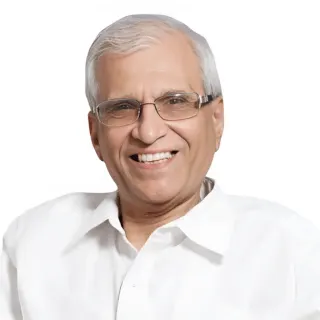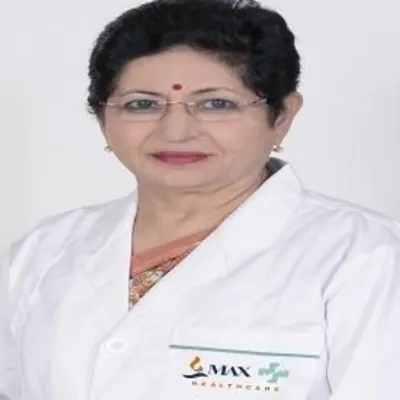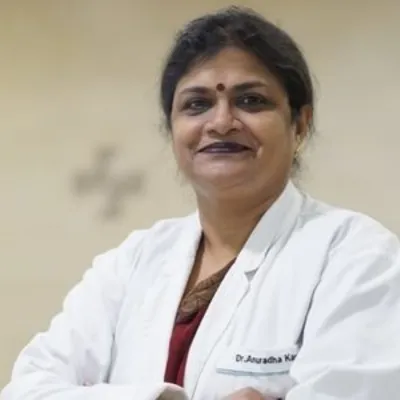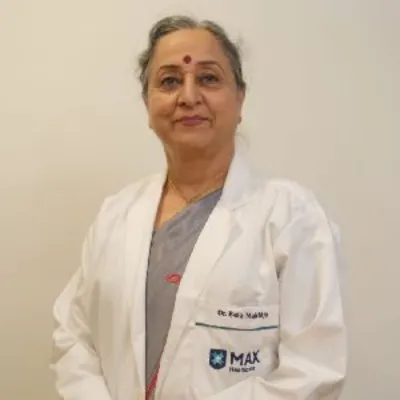Best Orthopedic Surgeons in Artemis Hospital Gurgaon
 17 December,2025
Read More
17 December,2025
Read More
Enquire now in case of any assistance needed
 19 April,2024
19 April,2024
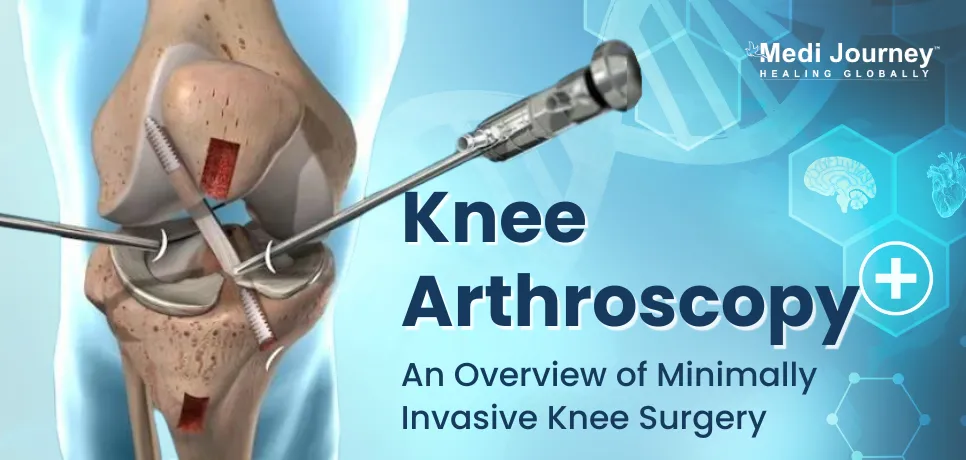
Imagine you are playing a sport or just walking and suddenly feel an intense pain in your knee. You go back home, and the pain persists for weeks. You pay a visit to the doctor and get a normal X-ray. An MRI scan is then performed, which reveals a torn meniscus as the cause of the pain. Despite trying several treatments such as rest, pain medicines, and physical therapy, the pain continues even after a month. At this point, surgery may seem like the only option, and you get scared by the name of it.
This is a common scenario for many individuals. However, with advancements in surgical techniques, you no longer need to worry about the complexities of knee surgeries. Knee arthroscopy is one such advancement that has changed the scenario for knee surgeries. Annually, over 2,000,000 knee arthroscopy procedures are performed worldwide.
This blog will help you better understand knee arthroscopy, how orthopedic specialists perform the surgery, its recovery time, and much more.
Fill up the form and get assured assitance within 24 hrs!
Knee injuries and conditions can vary from mild to severe. Sometimes, you may require surgery to replace part or all of the knee joint. However, in other cases, only the tissues around the knee joint, such as the ligaments, cartilage, and tendons, may need to be treated or repaired.
Knee arthroscopy is a minimally invasive orthopedic procedure that allows surgeons to view, diagnose, and correct problems inside the knee joint. It involves inserting a mini camera (arthroscope) through a small incision in the knee.
The camera displays real-time images on a screen, allowing the surgeon to see inside the knee and identify any issues. The surgeon can then use small instruments to repair or remove damaged tissue or bone.
Knee arthroscopy is often used to treat conditions such as torn meniscus, bursitis, damaged cartilage, or ligament injuries.
Standard knee arthroscopy procedures include meniscectomy, loose body surgery, ACL surgery, PCL reconstruction, and patella realignment surgery.
Orthopedic specialists recommend knee arthroscopy when there is excruciating pain in the knee. When non-surgical treatments such as physical therapy, icing, NSAIDs, and rest do not help improve pain, it is time for you to get the procedure.
The three primary reasons to have knee arthroscopy are –
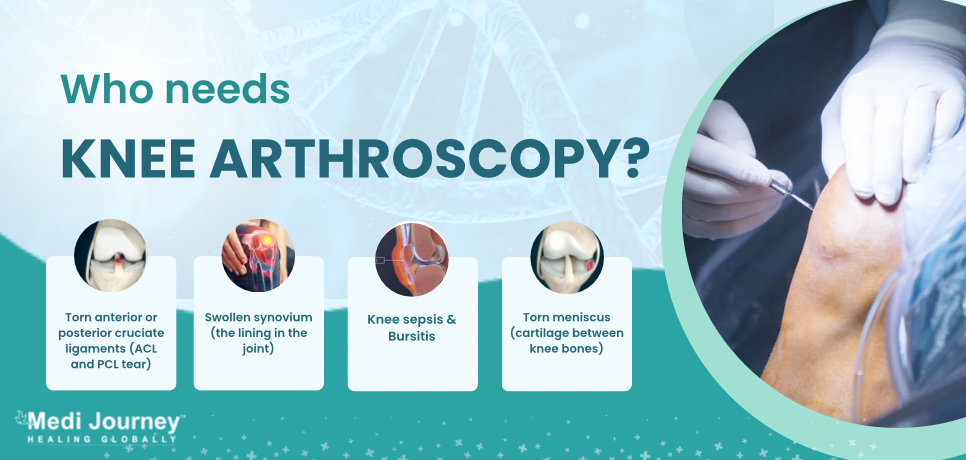
Knee arthroscopy is a standard orthopedic procedure to diagnose and treat several knee conditions and injuries. You might need knee arthroscopy if you have the following conditions –
If you have any of the above conditions, knee arthroscopy will be effective in the following ways -
Knee arthroscopy is a keyhole surgery that can diagnose and treat specific knee conditions. Let's understand the procedure by breaking it into three parts.
Once the knee surgery is complete, the nursing staff will take you to the recovery room. Most arthroscopy procedures are done on an outpatient basis, and you can go home on the same day.
Recovery after knee arthroscopy is swift compared to traditional open surgery and starts as soon as the procedure is complete.
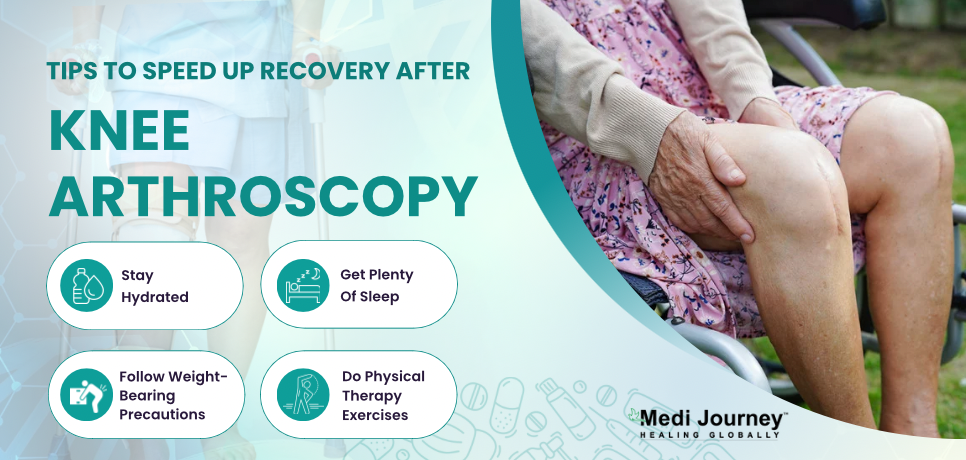
Recovery from knee arthroscopy can vary based on the type of procedure performed. Therefore, it is crucial to follow all instructions from your orthopedic surgeon and physiotherapist to promote optimal healing. Here are some recommendations for improving the recovery process:
Knee arthroscopic surgery is a safe and sound procedure. It has a success rate of 85 to 90%. The complication rate after knee arthroscopy is very low. However, every surgery carries a slight risk of complications with them. If complications occur after knee arthroscopy, they are usually minor and easily treatable. A few postoperative problems with knee arthroscopy are –
Risks associated with the use of anesthesia are breathing difficulties, infection, allergic reactions to the medications, and bleeding.
Knee arthroscopic surgery is a keyhole (minimally invasive) procedure that helps diagnose and treat specific knee conditions. During the procedure, orthopedic surgeons use small cameras and instruments to view the inside of the knee joint. This approach improves the accuracy of the surgery and usually requires fewer and smaller incisions than traditional surgery. Knee arthroscopy is most effective in treating injuries and conditions that have affected or damaged the knee's cartilage, ligaments, tendons, and other soft tissues.
Fill up the form and get assured assitance within 24 hrs!
Doctor of Pharmacy
Dr. Deepanshu Siwach is a skilled clinical pharmacist with a Doctor of Pharmacy degree.?He has 4+?years of experience and has worked with thousands of patients. He has been associated with some of the top hospitals, such as Artemis Gurgaon.
Director
Orthopedic and Joint Replacement Surgeon
Aakash Healthcare Super Speciality Hospital, Dwarka, New Delhi
Dr. Aashish Chaudhry is amongst the best Orthopedic Surgeons, with over 23 years of experience....
Senior Consultant
Medical Oncologist
Nanavati Super Specialty Hospital, Mumbai
WhatsApp UsSenior Director
Gynecologist and Obstetrician, IVF Specialist
Max Super Speciality Hospital, Shalimar Bagh, New Delhi
WhatsApp UsSenior Director
Gynecologist and Obstetrician, IVF Specialist
Max Smart Super Speciality Hospital, Saket, New Delhi
WhatsApp UsSenior Director
Gynecologist and Obstetrician
Max Smart Super Speciality Hospital, Saket, New Delhi
WhatsApp UsSenior Director
Gynecologist and Obstetrician
Max Smart Super Speciality Hospital, Saket, New Delhi
WhatsApp UsSenior Director
Gynecologist and Obstetrician
Max Smart Super Speciality Hospital, Saket, New Delhi
WhatsApp UsThe Art of Effective Communication
 17 December,2025
Read More
17 December,2025
Read More
 16 December,2025
Read More
16 December,2025
Read More
 10 December,2025
Read More
10 December,2025
Read More
 09 December,2025
Read More
09 December,2025
Read More
 05 December,2025
Read More
05 December,2025
Read More
 04 December,2025
Read More
04 December,2025
Read More
Trusted by Patients
"I am Asim from Bangladesh and was looking for treatment in India for neuro. I visited many websites to get the complete information regarding the treatment but I was not satisfied as I was getting confused. In the meanwhile, one of my friends suggested I seek help from Medi Journey as he experienced his medical journey very smoothly and was satisfied with it. They have filtered the top 10 doctors as per experience, the success rate of surgery & profile, so it helps us to choose the best treatment in India. "
"For my knee surgery, Medi Journey guided me to BLK Hospital where I received exceptional care. The team's support and the expertise at BLK Hospital exceeded my expectations. Thank you Medi Journey for making my medical journey stress-free. "
"I came from Iraq for my granddaughter's eye surgery in India facilitated by Medi Journey, due to critical cases they advised us to get a second opinion from the different hospitals before going to surgery. Finally, we went to Fortis Escort Hospital, which helped us to get more confidence for diagnosis. Fortis Escort Hospital has the best eye surgeon team with the latest instruments. Thanks to all team members for providing a high-quality treatment in India at an affordable cost. "
"I came for my hair transplant in India, before coming I was so confused about choosing the best clinic and surgeon for me. But thanks to God one of my friends had a hair transplant in India through Medi Journey. He recommended me to go with them. I am completely happy with my experience with them. They were always very fast in their responses to me. the success rate of my hair transplant surgery is 100%."
"Artemis Hospital, suggested by Medi Journey, turned out to be a great choice for my treatment. The personalized assistance and medical care were exceptional. I'm grateful to Medi Journey for guiding me to a hospital that perfectly matched my needs. Highly recommended! "
"I came from Afghanistan for my treatment in India at Jaypee Hospital, Noida. I had a fantastic experience with Medi Journey. Kudos to them for their incredible support during my medical journey. They not only took care of all the logistics but also connected me with a fantastic healthcare team. Efficient, caring, and highly recommended for a hassle-free medical tourism experience."
"I am Adam from Kano, Nigeria, one of my friends from Nigeria was facilitated by Medi Journey, and he recommended us to go with them. I sent my all reports to them and within 48 hours they reverted with 4 options from different hospitals. They helped me to get a Visa letter from the hospital, arrange pick-up from the airport, and book a hotel for me. Their team is very honest and throughout our stay in India they are with us they are caring for us like his family members. BLK Hospital is the best hospital in India with a top surgical oncologist surgeon team, a very advanced OT, and a Radiotherapy department. I wish more success to Medi Journey. "
"Great experience at the Max Hospital for my spine surgery and was successfully done. I thank my neurosurgeon and his entire team. I recommended all of my country's people to Medi Journey for treatment in India, they choose the best hospital, the best doctors, and the best cost for patients."
"I came to India from Dhaka, Bangladesh for my father-in-law's cardiac surgery at Fortis Hospital. I was confused about choosing the best surgeon for him before coming, but their team helped me to choose the best hospital and best cardiac surgeon in India with very good cost and 100% success rate of surgery. I am very happy with the services, really they make my journey so comfortable that make me feel at home. Thanks again and I like people to choose "Medi Journey" as your travel guide. "
"I am Mohammad from Bangladesh came to India for my general health checkup. Medi Journey offers me the complete package including Pick-up from the airport, hotel services, and 24-hour assistance. They guide you to choose the best hospital in India, the best cost of treatment with top-most doctors and give you complete information about hotel booking, and pick-up from the airport before coming to India They have the best team to help. Always choose Medi Journey for your treatment in India."
